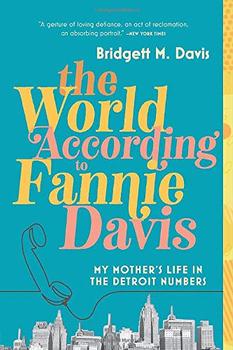Summary | Excerpt | Reviews | Beyond the Book | Readalikes | Genres & Themes | Author Bio

My Mother's Life in the Detroit Numbers
by Bridgett M. Davis
The fact that Mama gave us an unapologetically good life by taking others' bets on three-digit numbers, collecting their money when they didn't win, paying their hits when they did, and profiting from the difference, is the secret I've carried with me throughout my life. I've come to see it as her triumphant Great Migration tale: Fannie Davis left Jim Crow Nashville for Detroit in the midfifties with an ailing husband and three small children, and figured out how to "make a way out of no way" by building a thriving lottery business that gave her a shot at the American dream. Her ingenuity and talent and dogged pursuit of happiness made possible our beautiful home, brimming refrigerator, and quality education. Our job as her children was twofold: to take advantage of every opportunity she created, and to keep safe the family secret. The word illegal was never spoken, but the Numbers were by their nature and design an underground enterprise. We understood this. So my siblings and I followed her edict: Keep your head up and your mouth shut. Be proud and be private.
But as I grew older, our family secret became the paradox of my life. I idolized my mother and loved being her daughter, was especially grateful for the example she'd set. As an adult, I wanted to share with the world her generous nature and keen parenting skills and sharp business know-how. But of course the bravest, badass part of her life had to be kept hush-hush. I considered writing a thinly veiled fictional story, but even that felt too risky. And writing about my mother without mentioning the Numbers would be fruitless. I know because I tried and it didn't work. Mama and her Numbers were inextricably intertwined. So, I kept quiet.
After Mama died in 1992, my sister Rita briefly took over running the business; but she eventually closed it down and our family's life in Numbers ended, and with it, the threat of exposure disappeared. For the next two decades, I told no one but my husband what my mother had done for a living. The family secret, a handed-down order, was well in place by the time I was born. It was all I'd known my entire life. I am hardwired not to tell. I can still hear Mama's voice, hear her warning: "No good can come from running your mouth."
I believed her. And I didn't want to betray Mama's trust, nor dishonor her legacy. I worried that people would judge her, judge us, for her livelihood. Besides, as long as I kept her secret, abided by her rule, I kept her alive in my memory. Telling would be odd, might trigger a betrayal that led to forgetting. I grappled with that odd dissonance for a long time, proud of my mother but unable to brag about her.
Over time, as I began to understand the depth of my loss, my own feelings shifted, and I wanted to tell Mama's story; this desire grew into a smoldering, yearning urge that got harder and harder to suppress. I felt cheated. As dynamic and trailblazing as she was, I couldn't brag about her the way friends bragged about their own mothers going back to school to get a PhD, or surviving as divorced single moms or joining the Peace Corps at fifty. Now it was killing me to keep her life's work a secret, and I compensated by talking about her incessantly, quoting her pithy sayings whenever an opportunity presented itself. I made sure those who hadn't met her learned via my constant bragging how exceptional she was. If asked, I told people my mother had been "in real estate," that she managed properties she owned, that her livelihood came from collecting rent—a half-truth. (Little did I know that "being in real estate" was code for being a number runner.)
As more years passed, I began to feel remiss for not telling, guilty of omitting such a crucial fact about my mother's life. I talked about her less and less because of that guilt, and that saddened me, as I knew that my mother's work had transformed our family's lives, kept us going. It felt disrespectful, really, to keep quiet, as though I was dishonoring Mama with my silence. I was who I was because my mother chose to be a number runner, and my own children didn't even know who their grandmother had been, what she'd accomplished with her life. A secret, good or bad, weighs on you.
Excerpted from The World According to Fannie Davis by Bridgett M Davis. Copyright © 2019 by Bridgett M Davis. Excerpted by permission of Little Brown & Company. All rights reserved. No part of this excerpt may be reproduced or reprinted without permission in writing from the publisher.
Your guide toexceptional books
BookBrowse seeks out and recommends the best in contemporary fiction and nonfiction—books that not only engage and entertain but also deepen our understanding of ourselves and the world around us.